Day in the Life of a Family Practice Physician
In this commodity, we volition look at nine amazing benefits of play in child evolution. We will also review research results that highlight the importance of play.
Importance of Play in Child Development
Many parents intuitively know why play is of import to children, but despite its many benefits, we rarely acquaintance play with learning.
For well-nigh people, learning involves acquiring a specific new skill, such as memorizing alphabets, counting, writing, etc. They often believe that playing is only for fun and involves no bodily learning.
However, co-ordinate to studies, playing is learning. Children larn through playing.
The importance of play in early babyhood cannot be underestimated because playing is essential to a child'south growth.
For more assistance on calming tantrums, cheque out this step-by-stride guide
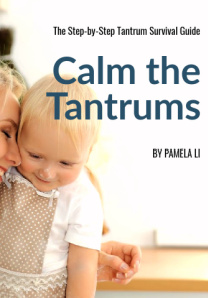
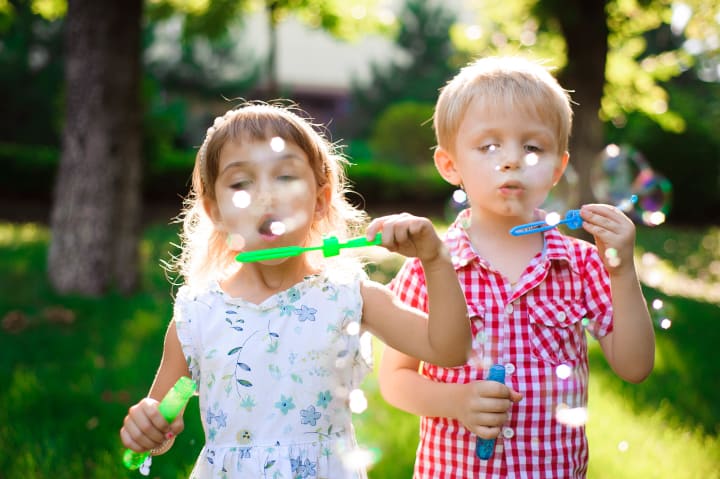
9 Benefits of Play
1. Stimulate Early Brain Development
Playing can promote a child's brain development in many ways, including providing crucial life experiences to prepare the grounds for brain growth 1 .
Baby brains are equipped with an glut of brain jail cell connections (synapses). Synapse overproduction allows information captured from the early years to build a foundation for the brain.
An environment enriched with play, sensory play and play materials provides the perfect life experiences to build that foundation. If those experiences are absent, the related synapses will be lost.
Neuroscientists discovered that enrichment such every bit toys, games, and playing tin alter a brain's chemistry and physiology. The brain expanse associated with higher cognitive processing (the cerebral cortex) tin can benefit from environmental enrichment and play more than other parts of the brain two .
two. Improve Intelligence
Early playing is besides found to be associated with higher intelligence after in life.
One study by the University of Arkansas shows that regularly offer toys to infants to play with leads to higher IQ by age three three . Later, psychologist Edward Fisher analyzed 46 studies done on play. He constitute that playing could enhance a child's cognitive, linguistics, and social development 4,5 .
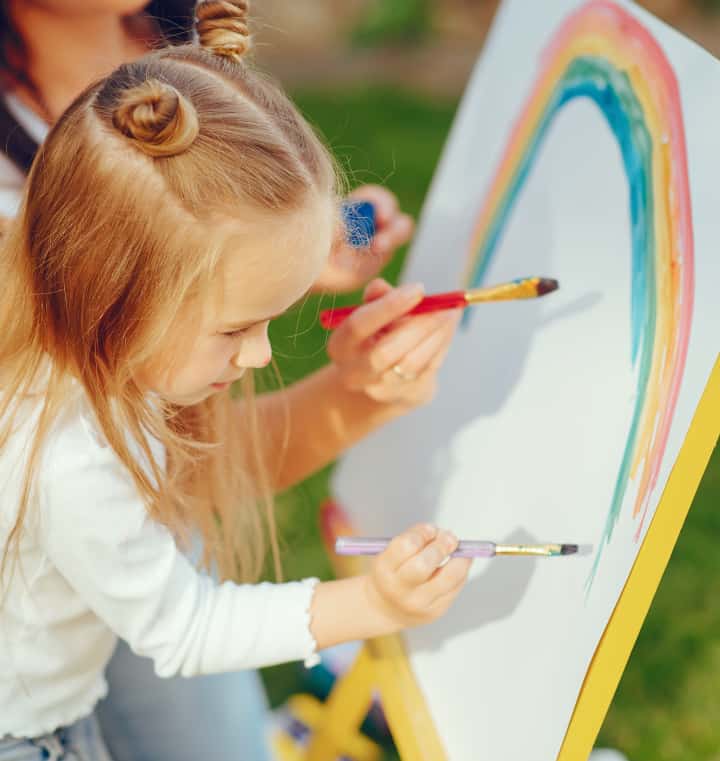
three. Spark Creative Thinking
Perhaps the most obvious benefit of playing is that information technology increases a child'due south inventiveness.
Creativity is closely tied to divergent thinking, which explores many possible solutions and typically generates creative ideas. Many studies have found that playing is highly associated with divergent thinking.
To test this association in a study, researchers randomly assigned 52 children, aged half dozen to 7, to two activities. In the first activeness, the children copied text from a chalkboard. In the 2nd, the children played with salt-dough 6 .
Afterward, all the children were asked to perform a artistic project. A panel of 10 judges found that the projects created by the children in the salt-dough group had higher creative qualities than those in the other group.
Other studies accept too associated free play, specially pretend-play, with significant improvement in divergent thinking seven,viii .
Gratuitous play is unstructured play that encourages children to explore and blueprint their own games 9 . Pretend play requires a child to imagine scenarios and and then act them out. The liberty of these types of playing allows children to be artistic 10,xi .
Imagination fuels creativity and some studies take also establish that artistic adolescents tend to have had imaginary friends in childhood 12 .

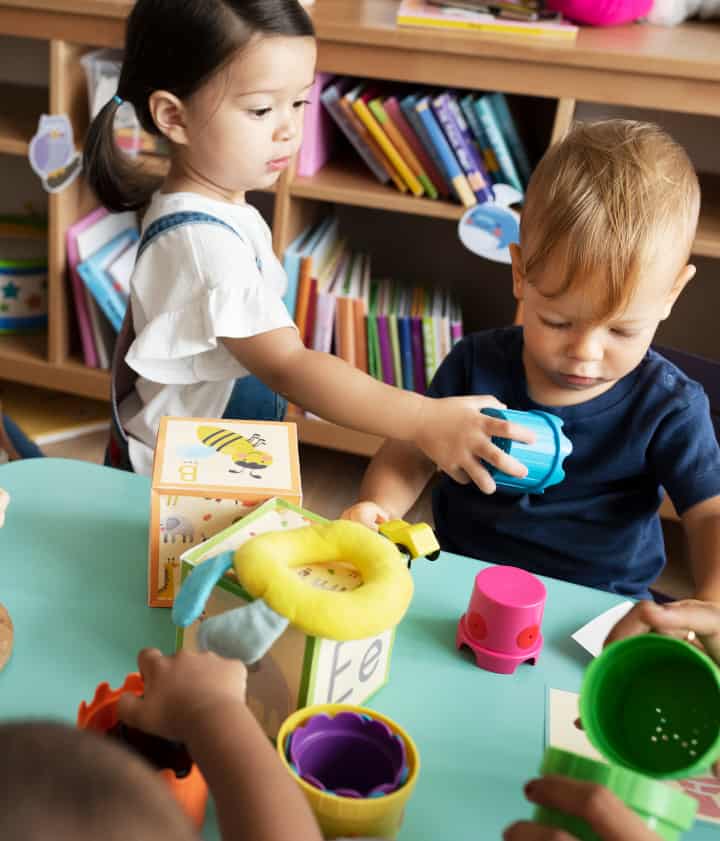
four. Improve Communication, Vocabulary, and Language
The link between early play and after communication skills is evident in research, too.
One study sought to empathize whether communication could benefit from play. Researchers observed what happened when an infant began playing with a toy. They found that if the mother responded by manipulating and naming the toys, the baby – when tested 3 months later – would have better language skills 13 .
Another report, conducted by the University of Georgia, observed sixty-five kindergartners in their classrooms over four weeks. The presence of play, especially pretend play, was found to predict functioning in pre-reading, language, and writing xiv .
Pretend-play is particularly beneficial because it allows young children to practice their vocabulary when they speak and attempt to understand others. During social play, they frequently reciprocate each other's words and actions to reach agreements 15 .
v. Promote Impulse Control and Emotion Regulation
Self-regulation is ane of the about essential skills for school readiness. Well-regulated children tin can wait for a plough, resist the temptation to grab objects from other children, control negative emotions, and persist through challenging activities.
In a New Zealand study, psychologists examined how children handled negative events during pretend plays. They found that children who had more pretend-plays with their caregivers were better at regulating their emotions to continue playing xvi,17 .
Emotion regulation is not only essential for academic success, simply it tin besides predict a kid's social success eighteen . In preschool, children who showroom better emotional command are more likable and socially competent 19 .
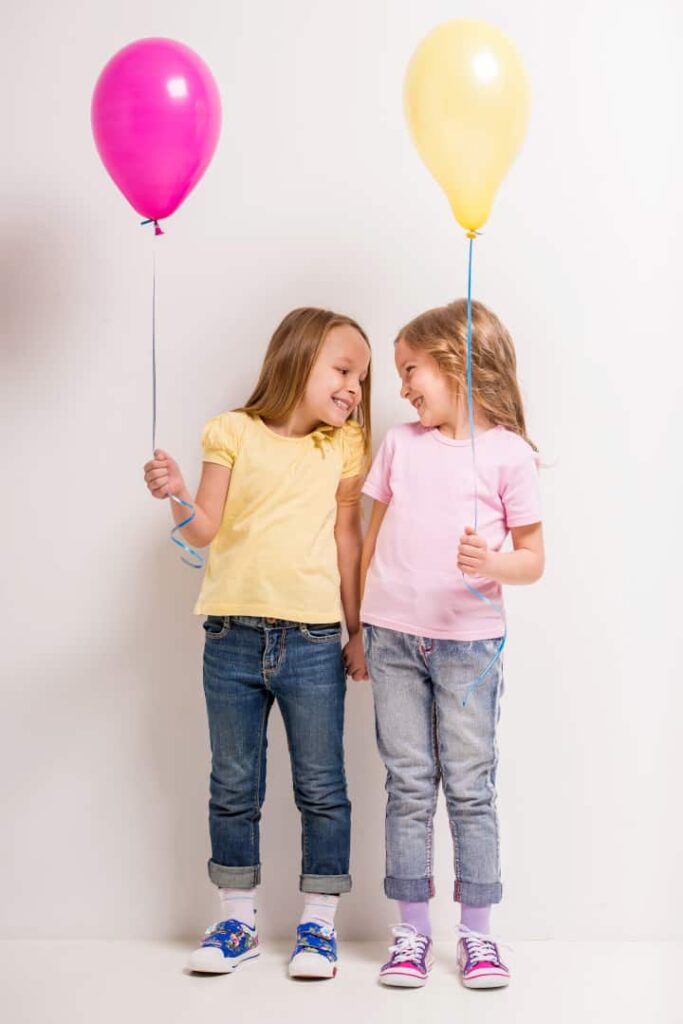
half-dozen. Grow Social Competence and Empathy
Playing is crucial in enhancing social development in children. Unstructured active play with others – including parents, siblings, and peers – is a pregnant opportunity to cultivate social skills. While playing, the deed of pretending equally well as negotiating with peers enhances children's social skills 20 .
Playing also provides opportunities for children to learn social interaction. While playing together, children learn to cooperate, follow the rules, develop cocky-command, and by and large get forth with other people.
Psychologists found that the amount and complexity of fantasy play by preschoolers significantly predicted their social skills and popularity, also as their positive social action 21 .
Playful children tend to be happier, better adjusted, more co-operative, and more popular with their peers than those who play less.
Children who play more than also develop more empathy, some other essential element that advances social skills. Such children abound to have a improve agreement of other people'due south feelings and behavior.
7. Ameliorate Concrete and Mental Health
We already know that play promotes emotion regulation, which is vital for a child's resilience and mental health.
Playing that involves physical activities promotes motor skills, forcefulness, and endurance, which benefits physical health.
8. Teach Life Lessons
Play helps children develop the ability to solve problems.
When children act out life'due south problems when pretend-playing, it helps them cope with the struggles in their own ways. It besides provides a safety opportunity for children to rehearse skills and future social roles.
When children try out various roles, they learn to take on different perspectives, which will further help them in abstract thinking 22 .

9. Strengthen Relationship with Caretakers and Peers
Parents who play with their children form a stronger bail with them. Even a simple game similar peekaboo can go a special bonding moment for both parents and children. These interactions provide positive life experiences that stimulate children'due south encephalon development.
Last simply not least, happy, playful moments are some of the well-nigh precious gifts we can give our children.
Last Thoughts on Play
Considering play is imperative in a child's development, play-based preschools may provide a better learning environs than other alternatives 23 . When choosing a preschool, parents should pay attending to how classes are conducted, whether the "play to learn" approach is used, and how much free-play is allowed. Creating a Montessori home is likewise a good culling.
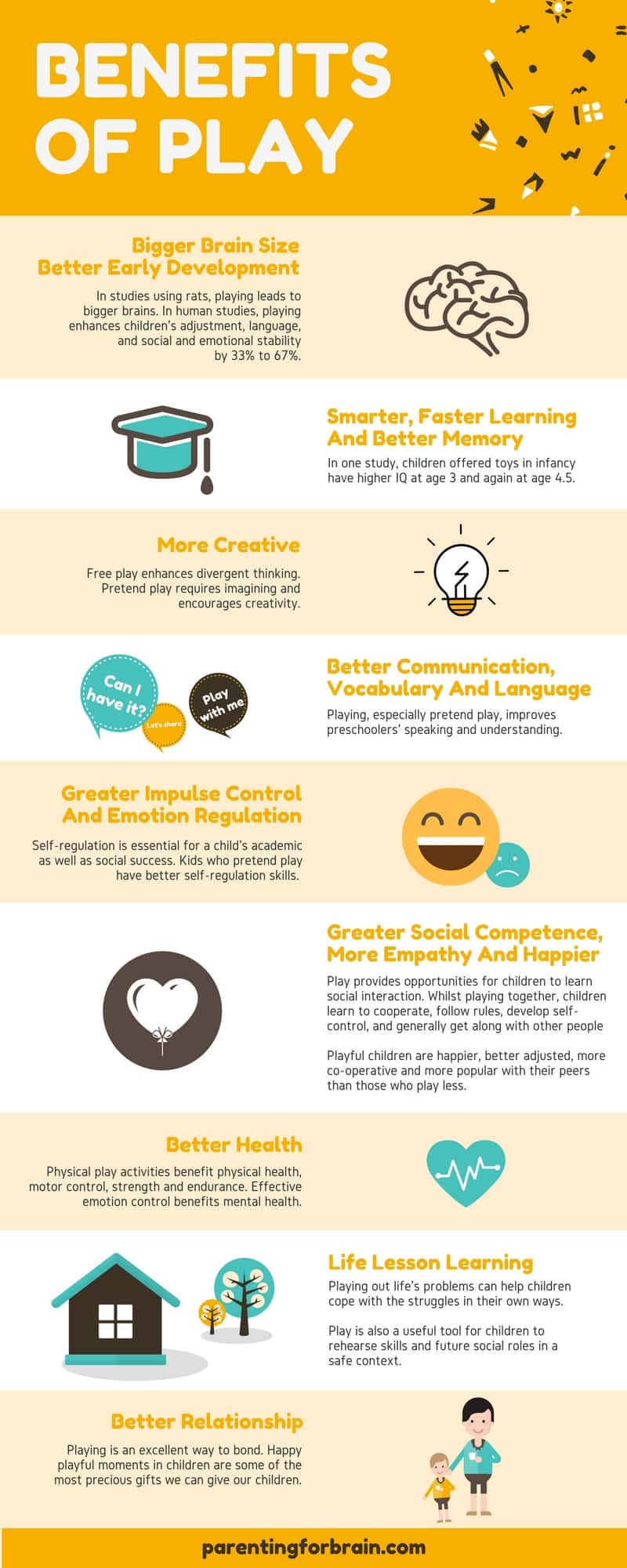
References
-
1.
Rosenzweig M, Bennett E. Psychobiology of plasticity: effects of training and experience on brain and behavior. Behav Brain Res. 1996;78(i):57-65. https://www.ncbi.nlm.nih.gov/pubmed/8793038.
-
3.
Elardo R, Bradley R, Caldwell BM. The Relation of Infants' Dwelling house Environments to Mental Test Performance from Half dozen to Xxx-Six Months: A Longitudinal Analysis. Child Development. March 1975:71. doi:10.2307/1128835
-
4.
Bergen D. The Office of Pretend Play in Children'south Cognitive Evolution. Early Childhood Enquiry & Practice. 2002;four(i).
-
5.
Fisher EP. The impact of play on evolution: A meta-analysis. Play & Culture. 1992;v(ii):159-181.
-
6.
Howard-Jones P, Taylor J, Sutton 50. The Effect of Play on the Creativity of Young Children During Subsequent Action. Early Child Evolution and Intendance. August 2002:323-328. doi:x.1080/03004430212722
-
7.
Holmes RM, Romeo L. Gender, play, language, and creativity in preschoolers. Early Kid Development and Intendance. Nov 2013:1531-1543. doi:10.1080/03004430.2012.733381
-
8.
Russ SW, Wallace CE. Pretend play and artistic processes. American Journal of Play. 2013;six(one):136-148.
-
9.
Burdette HL, Whitaker RC. Resurrecting Free Play in Young Children. Arch Pediatr Adolesc Med. Jan 2005:46. doi:ten.1001/archpedi.159.one.46
-
10.
Dansky JL. Make-Believe: A Mediator of the Relationship betwixt Play and Associative Fluency. Child Development. June 1980:576. doi:ten.2307/1129296
-
xi.
Dansky JL, Silverman IW. Effects of play on associative fluency in preschool-aged children. Developmental Psychology. 1973:38-43. doi:10.1037/h0035076
-
12.
Schaefer CE. Imaginary companions and artistic adolescents. Developmental Psychology. 1969:747-749. doi:10.1037/h0028270
-
xiii.
Newland LA, Roggman LA, Boyce LK. The development of social toy play and language in infancy☆ iii 3☆ This enquiry was funded past a University Kinesthesia Grant to Lori Roggman from the Vice President for Research at Utah State University, 1990–1992, by a College of Family Research Grant to Lori Roggman, 1998–2000, by a Fellowship to Lisa Newland from the Vice President for Inquiry at Utah Country University, 1997–1998, and past a College of Family Life Fellowship to Lisa Newland, 1998–2000. Infant Behavior and Development. January 2001:one-25. doi:10.1016/s0163-6383(01)00067-iv
-
14.
Pellegrini AD. The relationship betwixt kindergartners' play and accomplishment in prereading, language, and writing. Psychol Schs. October 1980:530-535. https://eric.ed.gov/?id=ej236155.
-
15.
Lewis 5, Boucher J, Lupton 50, Watson S. Relationships betwixt symbolic play, functional play, verbal and not-verbal power in young children. Int J Lang Commun Disord. 2000;35(1):117-127. https://www.ncbi.nlm.nih.gov/pubmed/10824228.
-
16.
Galyer KT, Evans IM. Pretend Play and the Development of Emotion Regulation in Preschool Children. Early Child Development and Intendance. January 2001:93-108. doi:x.1080/0300443011660108
-
17.
Hoffmann J, Russ S. Pretend play, creativity, and emotion regulation in children. Psychology of Aesthetics, Creativity, and the Arts. May 2012:175-184. doi:ten.1037/a0026299
-
nineteen.
Mayberry ML, Espelage DL. Associations Among Empathy, Social Competence, & Reactive/Proactive Aggression Subtypes. J Youth Adolescence. July 2006:787-798. doi:10.1007/s10964-006-9113-y
-
xx.
Doyle A-B, Connolly J. Negotiation and enactment in social pretend play: Relations to social acceptance and social knowledge. Early Babyhood Enquiry Quarterly. September 1989:289-302. doi:ten.1016/0885-2006(89)90015-ten
-
21.
Connolly JA, Doyle A-B. Relation of social fantasy play to social competence in preschoolers. Developmental Psychology. 1984:797-806. doi:10.1037/0012-1649.twenty.5.797
-
22.
Youngblade LM, Dunn J. Private Differences in Young Children'southward Pretend Play with Mother and Sibling: Links to Relationships and Understanding of Other People's Feelings and Beliefs. Child Development. October 1995:1472. doi:ten.2307/1131658
-
23.
Diamond A, Barnett WS, Thomas J, Munro S. THE EARLY YEARS: Preschool Programme Improves Cerebral Control. Science. November 2007:1387-1388. doi:10.1126/science.1151148
Source: https://www.parentingforbrain.com/benefits-play-learning-activities-early-childhood/
0 Response to "Day in the Life of a Family Practice Physician"
Post a Comment